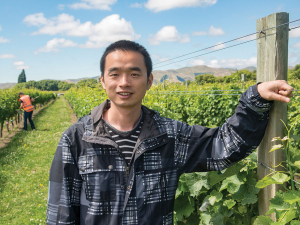Science system shakeup ‘to maximise investment value’
Reaction to the Government’s major overhaul of the country’s seven crown research organisations has so far been largely positive.
 The best viticulture paper was awarded to the research team led by Dr Junqi Zhu from Plant & Food Research.
The best viticulture paper was awarded to the research team led by Dr Junqi Zhu from Plant & Food Research.
The inaugural New Zealand Wine Centre Scientific Research Conference was designed “by researchers for researchers”, says co-organiser Dr Stewart Field, Viticultural Researcher at Nelson Marlborough Institute of Technology .
Held in Blenheim late last year, the one-day event was a collaboration between key research providers to the wine industry, designed to replicate overseas conferences. Stewart says it provided a forum for researchers, postgraduate students, and industry technical specialists to meet and connect, increase research awareness, and encourage collaboration.
Stewart worked alongside Dr Julian Theobald from Plant & Food Research, Ngarita Warden and Dr Carmo Vasconcelos from Bragato Research Institute, Dr Amber Parker from Lincoln University, and Dr Sarah Knight from Auckland University, to develop a programme focused on fundamental science-based research.
Julian says the committee deliberately didn’t choose one specific theme, but was led by current research. And they were overwhelmed by the response to requests for abstracts, with more than 50 submissions. “This showed us the wide breadth of New Zealand wine research,” Julian says. It was challenging to select presenters, but it allowed all facets of wine industry research to be included from “the soil to the finished wine in the bottle”.
The organisers wanted to give master’s and PhD students a chance to present their ongoing research, Stewart says. “Presenting to a major conference in a full auditorium can be scary for new researchers. This conference gave current students the chance to present their findings to a smaller and hopefully less daunting audience”.
A total of five master’s and PhD students presented at the conference, including Auckland University PhD candidate Gillean Miller, who won the best student presentation prize for her research into the ‘Biogenesis of γ-Nonalactone during Winemaking’. These y-Nonalactone compounds are associated with coconut, sweet, and stone fruit aromas and Gillean’s research investigated their importance in New Zealand Pinot Noir.
Other prizes presented during the conference included awards for the best published paper for both wine and viticulture research judged by an international panel. The best wine research paper was won by Yanzhuo Kong and the team at Lincoln University. Their research examined epigenetic changes in wine yeast as an alternative to genetic modification. This research is particularly relevant in New Zealand, as it reported for the first time utilising a non-GMO approach to alter the fermentation process of Pinot Noir wines.
The best viticulture paper was awarded to the research team led by Dr Junqi Zhu from Plant & Food Research for work developing the first grapevine model for APSIM (The Agricultural Production Systems sIMulator). The model allows simulation of radiation interception, leaf growth, carbohydrate and nitrogen allocation and storage, and yield formation of the grapevine. In future, this research can be used to explore the long-term suitability of different crop loads, based on the yield between years and the carbohydrate reserves in winter.
Further highlights of the conference were the two international keynote speakers sharing their current research projects. Dr Marco Hofmann, from the Department of General and Organic Viticulture at the Hochschule Geisenheim University, shared his research on climate change and its impact on viticulture and the water budget of vineyards, while Dr Jason Smith, a Senior Research fellow at the Orange Campus of Charles Sturt University, discussed his work on vineyard water balance and the adaptation of production systems to rainfall variability and drought. Together they have been working on grapevine water models as they apply it for vineyards in Australia.
Julian says the overall feedback from attendees was very positive and the committee is now considering whether to make it an annual or biannual event. “Wine research is moving so quickly; it would be great if we can keep up the momentum.”

The end of the year is fast approaching, so here are some thoughts on a few of the significant developments…

OPINION: When I moved to Marlborough two decades ago, I found countless lines of tidy vines, neatly mowed and carefully…
The large 2025 harvest will exacerbate the wine industry's "lingering" supply from recent vintages, New Zealand Winegrowers Chief Executive Philip…
If you find a new consumer in a developed wine market, you are taking them from someone else, says Blank…
A New Zealand startup is providing growers with vital information for daily operations and long-term vineyard management, using a unique…